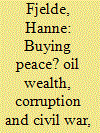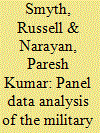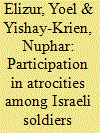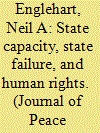|
|
|
Sort Order |
|
|
|
Items / Page
|
|
|
|
|
|
|
| Srl | Item |
| 1 |
ID:
087568


|
|
|
|
|
| Publication |
2009.
|
| Summary/Abstract |
This article argues that, contrary to received wisdom, political corruption is not necessarily associated with a higher risk of civil war in oil-rich states. Political corruption can be used to accommodate opposition and placate restive groups by offering private privilege in exchange for political loyalty. Since oil wealth is associated with large rents accruing in state treasuries, it provides an economic foundation for such clientelist rule. This article thus argues that oil-rich governments can use political corruption to buy support from key segments of society, effectively outspending other entrepreneurs of violence. Based on a logit analysis of civil war onsets, 1985-99, the article finds support for this `co-optation argument'. A negative and statistically significant interaction term between oil production and political corruption is consistent across different models and robust to a number of specifications. While both variables per se increase the risk of conflict overall, higher levels of corruption seem to weaken the harmful impact of oil on the risk of civil war. This finding suggests the need for a more nuanced understanding of the relationship between natural resource wealth, governance and armed conflict. Political corruption has prolonged poverty and bred economic and political inequality in many oil-rich states, but it has also helped cement powerful alliances with a stake in the continuation of the corrupt regimes.
|
|
|
|
|
|
|
|
|
|
|
|
|
|
|
|
| 2 |
ID:
087571


|
|
|
|
|
| Publication |
2009.
|
| Summary/Abstract |
While a number of studies examine the nexus between military expenditure and economic growth, little consideration has been give to the effect of military expenditure on external debt. This article examines the impact of military expenditure and income on external debt for a panel of six Middle Eastern countries - Oman, Syria, Yemen, Bahrain, Iran, and Jordan - over the period 1988 to 2002. The Middle East represents an interesting study of the effect of military expenditure on external debt because it has one of the highest rates of arms imports in the world and it is one of the most indebted regions in the world. The study first establishes whether there is a long-run relationship between military expenditure, income, and external debt in the six countries using a panel unit root and panel cointegration framework and then proceeds to estimate the long-run and short-run effects of military expenditure and income on external debt. The study finds that external debt is elastic with respect to military expenditure in the long run and inelastic with respect to military expenditure in the short run. For the panel of six Middle Eastern countries, in the long run a 1% increase in military expenditure results in between a 1.1 % and 1.6% increase in external debt, while a 1% increase in income reduces external debt by between 0.6% and 0.8%, depending on the specific estimator employed. In the short run, a 1% increase in military expenditure increases external debt by 0.2%, while the effect of income on external debt is statistically insignificant.
|
|
|
|
|
|
|
|
|
|
|
|
|
|
|
|
| 3 |
ID:
087573


|
|
|
|
|
| Publication |
2009.
|
| Summary/Abstract |
Atrocities committed by soldiers are a common occurrence that harms not only victims, but also perpetrators, armies, and nations. However, censorship, limited access to information, and the tendency to deny one's evil and project it onto the other impede investigation into how ordinary soldiers cross the line between legitimate fighting and excessive violence. This study examined processes associated with Israeli soldiers' brutal behaviors during the first Intifada. Participants were 21 male combat veterans of two companies stationed in Gaza whose sampling reflected diversity in Israeli society and a wide range of behaviors in the Intifada. Situational factors and social-psychological processes (i.e. modeling, moral disengagement, dehumanization, and deindividuation) were powerful inducers of brutality. The data also showed individual differences in violence, inner-outer directedness, and moral standards. Consequently, five subgroups were identified: Callous/Impulsive, Ideologically Violent, Followers, Restrained, and Incorruptible. The use of these categories to examine the soldiers' unfolding experience over time generated a unique perspective into two less studied dynamics. The first was a synergistic interaction between dispositional and situational factors, manifested in level of brutality and differential subgroup stability of violent behaviors over time. The second was the company as a family-like primary social system that developed inner culture and structural patterns characterized by alignments and social power. Initially, there evolved a culture of brutality with an associated leadership that escalated the violence. A later clash with soldiers who adhered to the army's professional culture transformed the company's culture and structure. This analysis has implications for preventive measures, including the development of morally committed and resolute leadership at both lower and higher echelons of command.
|
|
|
|
|
|
|
|
|
|
|
|
|
|
|
|
| 4 |
ID:
087565


|
|
|
|
|
| Publication |
2009.
|
| Summary/Abstract |
While it is universally recognized that states are responsible for human rights conditions in their jurisdictions, it is less often noticed that this responsibility has two dimensions, one normative and one empirical. Normatively, most people agree that states ought to prevent human rights abuses. Empirically, however, states may not always be able to do so. In weak and failing states, agency loss and the inability to police effectively can lead to abuses by private individuals and rogue agents of the state. Thus, on balance, weak states typically have worse human rights records than strong ones. This is demonstrated by a global time-series cross-section analysis showing that indicators of state weakness - low tax revenues, corruption, and lack of law and order - all have a negative impact on human rights to personal security. The effect differs for different kinds of rights. Extrajudicial killings are highly sensitive to state capacity, while political imprisonment is more sensitive to democracy. Overall, however, it appears that the totalitarian model of human rights abuse by excessively strong states applies to a restricted set of cases. The more common problem is states that cannot effectively protect human rights. We must take state failure seriously when thinking about the causes of - and remedies for - human rights abuse
|
|
|
|
|
|
|
|
|
|
|
|
|
|
|
|
| 5 |
ID:
087566


|
|
|
|
|
| Publication |
2009.
|
| Summary/Abstract |
Respect for human rights is one of several factors influencing US aid allocation decisions. Whereas previous research identifies human rights practices as being of secondary importance, it typically does not explore whether there is a more complicated relationship between human rights practices and US aid allocation. The authors argue that the impact of human rights varies at different levels of democracy and economic development. Employing data on 151 countries from 1977 to 2004, this study also investigates whether there has been an increase in the impact of human rights practices since the end of the Cold War. The results of the analysis show that during the Cold War, economic development was the prevailing factor in decisions about whether to allocate US aid. In the post-Cold War era, human rights practices are one among several significant variables, albeit exerting a generally negative impact. These results indicate that shifts in the international environment have, in fact, altered the determinants of US foreign aid. The authors further demonstrate that after the Cold War, countries with low economic development and transitioning regimes are subject to diminished levels of accountability for their human rights practices, while aid allocations to autocratic regimes follow the logic of promoting relatively higher human rights standards
|
|
|
|
|
|
|
|
|
|
|
|
|
|
|
|
| 6 |
ID:
087569


|
|
|
|
|
| Publication |
2009.
|
| Summary/Abstract |
Why do some democracies break their security commitments whereas others do not? This study proposes a research strategy to answer the question by analyzing the timing of unilateral exits from a coalition military operation. Coalition participants typically do not exit until a military mission has been accomplished. However, in the case of the US-led coalition occupying Iraq since May 2003, 16 states have unilaterally withdrawn their armed forces. Despite the danger such defections may cause to the relationship of these states with the USA, why and when do they exit? The author creates a dataset with a state-month unit of analysis that contains information on 37 partner states and applies a Cox proportional hazard model. The study finds that the occurrence of a national election serves as a strong driving force to accelerate an exit from the coalition. An incumbent leader who faces a challenger who opposes military contributions in Iraq would reverse the policy to support the USA and exit the coalition to win an election, even at the risk of damaging a bilateral relationship with the USA. A change in leadership after an election, on the other hand, failed to be a predictor of the timing of defection. Furthermore, results reveal that the division of power within the government and the constitutional rules that enable significant parliamentary control over executive decisions to use force neither delay nor accelerate the timing of withdrawal. To understand the conditions under which democracies break their security commitments, more attention should be paid to election cycles than to a change in leadership and to types of democratic institutional and constitutional arrangements
|
|
|
|
|
|
|
|
|
|
|
|
|
|
|
|
|
|
|
|
|